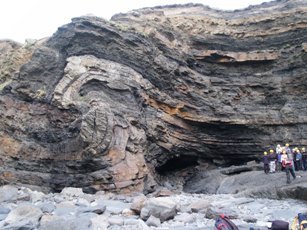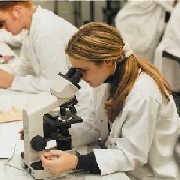This pages is primarily intended for existing students. It consists of modules available to Natural Sciences students, Joint-Honours regulations and general advice (which includes links to Departmental advice.)
The following lists the module code and the title of each module by the level of each module - clicking on the link will take you to further details listed in the Faculty Handbook.
The last digit of the module code indicates whether the module is single, double or triple. The level indicates the year in which modules are normally taken, but it is often the case that students take modules from the adjacent level beneath the year of study. Visit the Subjects page for the general overarching rules and structure.
Please note that the modules on offer and the requirements for progression can change from year to year and that the only combinations of modules that are guaranteed to fit in the timetable are those splits between the two departments on an approved Joint Honours route (MSci and BSc).
Within Natural Sciences, Earth Sciences has BSc Joint-Honours programmes with: Biology; Chemistry; Geography.
In BSc students' final year, they are required to take no less than 20 credits and no more than 60 credits of Capstone Modules. MSci student students are not required to take a capstone module, but rather take a Dissertation/Project in Year 4. Dissertation/Project/Capstone modules are denoted with
GEarth Sciences modules available to Natural Sciences students
Level 1 modules
Earth Materials (GEOL1021)
Field Studies (GEOL1051)
Mathematical Methods In Geosciences (By concession) (GEOL1061)
Further Mathematics For Geosciences (GEOL1081)
Understanding Earth Sciences (GEOL1101)
Environmental Earth Sciences (GEOL1111)
Sustainability (GEOL1141)
Introductory Data Science For Geoscientists (GEOL1151)
Level 2 modules
Sedimentary Environments (GEOL2031)
Geophysical Methods For Geoscientists (GEOL2081)
Isotopes And Climate (GEOL2171)
Fieldwork (geological) (GEOL2191)
Fieldwork (environmental) (GEOL2201)
Igneous And Metamorphic Processes (GEOL2231)
Fieldwork (geophysical) (GEOL2241)
Frontiers In Palaeontology (Term 2) (GEOL2317)
Geophysical Data Applications (Term 1) (GEOL2327)
Earth System And Climate: Long-term Processes (Term 2) (GEOL2337)
Ancient Life And Its Environment (Term 1) (GEOL2347)
Earth System And Climate: The Quaternary (Term 1) (GEOL2357)
Structural Geology (Term 1) (GEOL2367)
Tectonics (Term 2) (GEOL2377)
Level 3 modules
DissertationG (GEOL3022)
Environmental Geochemistry (GEOL3041)
Volcanology And Magmatism (GEOL3051)
Earth Sciences Into SchoolsG (GEOL3251)
Environmental Management (GEOL3281)
Earthquake Sources And Waves (Term 2) (GEOL3327)
Tectonic Processes And Renewable Geo-resources (Term 2) (GEOL3357)
Western Alps Field Trip (anatomy Of A Subduction Zone) (Term 1) (GEOL3367)
Monitoring The Oceans: Geohazards And Climate Change (Term 1) (GEOL3377)
Atmospheric Circulation And Dynamics (Term 2) (GEOL3387)
Earth System And Climate: The Quaternary (Term 1) (GEOL3407)
Habitable Environments (astrobiology) (Term 1) (GEOL3417)
Groundwater Hydrology (Term 2) (GEOL3427)
Polar Quaternary Environmental Processes (Term 1) (GEOL3437)
Earth System And Climate: Long-term Processes (Term 2) (GEOL3447)
Volcanic Hazards And Impacts (Term 2) (GEOL3457)
Geochemistry Of The Earth (Term 2) (GEOL3467)
Science EnterpriseG (NSCI3001)
Level 4 modules
Research ProjectG (GEOL4053)
Science Communication (GEOL4061)
Earth Science Field Seminar (GEOL4081)
Earth Sciences Into Industry (GEOL4091)
Monitoring The Oceans: Geohazards And Climate Change IV (Term 1) (GEOL4207)
Polar Quaternary Environmental Processes IV (Term 1) (GEOL4217)
Volcanology And Magmatism IV (GEOL4221)
Volcanic Hazards And Impacts IV (Term 2) (GEOL4247)
Requirements for Joint Honours (BSc and MSci Programmes)
Please note that these requirements are just for the B.Sc. degrees and the M.Sci. in Natural Sciences, requirements for the JH M.Sci. degrees involving Earth Sciences are detailed
elsewhere.
Geological Sciences
Advice for progression and other aspects
Department advice: Handbook
Natural Sciences advice
Year 1
| Geological Sciences: If you want to take 40 credits of Earth Sciences, then Earth Materials (GEOL1021) is advised in addition to Understanding Earth Sciences (GEOL1101).
For accreditation Field Studies (GEOL1051) must be taken at either Level 1 or Level 2.
All students wanting to obtain accreditation must take the two "Joint-Honours" modules and Field Studies (GEOL1051) - see the Faculty Handbook for definitive guidance.
Note: See the last few paragraphs of the BSc and MSci degree regulations to find out about degree accreditation.
Progression from: GEOL1021; GEOL1101; GEOL1051. |
Year 2
| Geological Sciences: To obtain accreditation modules to the value of 60 credits or more must be taken and must include (the latter module may be taken at level 1): Fieldwork (geological) (GEOL2191); Environmental Earth Sciences (GEOL1111) - see the Faculty Handbook for definitive guidance.
General: For the mathematically inclined with some programming experience Isotopes And Climate (GEOL2171), Modelling Earth Processes II (GEOL2251) have "no prerequisites".
See the last few paragraphs of the BSc and MSci degree regulations to find out about degree accreditation.
Progression from: GEOL2191; GEOL1111; GEOL2171; GEOL2251. |
Year 3
| Geological Sciences: To obtain accreditation modules to the value of 80 credits or more must be taken and must include Dissertation (GEOL3022) - see the Faculty Handbook for definitive guidance.
General: Earth System And Climate (GEOL3231) has no prerequisites.
See the last few paragraphs of the BSc and MSci degree regulations to find out about degree accreditation.
Progression from: GEOL3022; GEOL3231. |
For more information about the Natural Sciences degree programme, please contact:
Prof James Blowey
Deputy Head of Faculty
Faculty of Science Office
Level 3 Chemistry Building
Durham University
DH1 3LE
UK
Email: Natural Sciences Director
WWW: Natural Sciences home page
The Natural Sciences web pages are maintained by James Blowey



